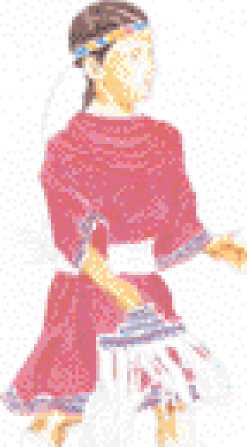In the late 1700s and early 1800s, when the young United States was just beginning to flex its muscles and expand to its present shape, two Shawnee brothers rose to prominence. One was the medicine man Ten-skwatawa, but called Shawnee Prophet by non-Indians. Like Delaware Prophet before him of the LENNI LENAPE (Delaware), he preached to Indians of many tribes, telling them to return to traditional ways and abandon all customs that came from whites, such as the Christian religion and liquor. He claimed to have special “magic” in the fight against whites.
His probably older brother Tecumseh was a great orator and a man of energy and action. Also a visionary, he dreamed of a great Indian country from Canada to the Gulf of Mexico, made up of allied tribes. He believed that no single Indian or tribe had the right to give up lands because the lands belonged to all Indians and all tribes. For that reason, he refused to sign the Treaty of Fort Greenville in 1795 after Little Turtle’s War. Tecum-seh considered himself an Indian first and a Shawnee second. To carry out his dream, he believed a united military stand would be necessary.
Tecumseh did not hate whites, even though they had killed his father and brother in previous wars. He is said to have admired them for their many accomplishments. He studied world history and literature in order to better understand them. He might have had a romance with a white schoolteacher, Rebecca Galloway. And he believed that one should treat prisoners fairly, whatever their nature or nationality, without degradation and torture.
For his wisdom, compassion, and, as he later proved, his military genius, many consider him the greatest man of his age, a man who would have made the perfect leader for the Indian country that might have been, a man to rival in capabilities any president the United States has ever produced.
Tecumseh worked hard to accomplish his goal. He traveled from the Old Northwest to the Deep South to urge unity among the Indians. He spoke to many tribes. Some resisted the idea of allying with former enemies. But Tecumseh persisted. Unity was everything, he claimed. If the tribes didn’t unite, they would go the way of the tribes of the Atlantic seaboard who were now extinct or dispersed.
“Where today are the Pequots?” he asked his fellow Indians. “Where are the Narragansetts, the Mohawks,

The Pocanets, and many other once-powerful tribes of our people? They have vanished before the avarice and oppression of the white man, as snow before the summer sun. . . . Will we let ourselves be destroyed in our turn without making an effort worthy of our race?”
Tecumseh was such a persuasive speaker and a magnetic personality that even stubborn chiefs started to come around to his way of thinking. With trip after trip, speech after speech, council after council, Tecumseh’s dream was becoming a reality.
All his work became unraveled in 1811 by bad luck and by his brother’s misjudgment. While Tecumseh was in the South, William Henry Harrison, then the governor of Indiana Territory, ordered an attack on Tenskwatawa’s village of Prophetstown on the Tippecanoe River. Harrison’s excuse for the expedition was that Indians had stolen army horses. Rather than avoid fighting at all costs and wait until the Indian military alliance was in place, Tenskwatawa followed the advice of some young militants and ordered an ambush. The Indians were repelled. Harrison’s army marched on Prophetstown and burned the village to the ground. Most of the warriors escaped, however.
It was not a major victory in a military sense, although Harrison later claimed so in his presidential campaign. But it broke the momentum of Tecumseh’s Rebellion. Tenskwatawa’s magic had been proven ineffective. Many of the tribes decided to make raids prematurely in their own territories, rather than wait for a united stand under Tecumseh.
The War of 1812 soon broke out between the United States and Great Britain, at that time in firm control of Canada. Tecumseh, hoping for British help in organizing an Indian homeland, joined the fight against the Americans. The British recognized his leadership abilities and made him a brigadier general in their army. Because of his participation, some Indians joined the British cause. But others held off their support, waiting for the outcome.
Tecumseh proved himself a great general. His skill often made up for the incompetency of the other British generals. He helped take Detroit. He slowed the victorious advance of an American force under William Henry Harrison. When most of the British fled in panic back to Canada, Tecumseh and his men covered the retreat. Unlike other generals, he stayed on the front lines, urging his men on. But on October 5, 1813, at the Battle of the Thames, Tecumseh took bullet after bullet from soldiers in the larger American force and finally fell dead.
Although a group of Kentuckians skinned a body they thought to be Tecumseh’s for souvenirs, they never found his actual corpse. Fellow warriors must have hidden it from the enemy. Rumors persisted among the tribes that Tecumseh would one day return. But of course he never did. Tenkswatawa lived about another 20 years and continued to preach to the tribes of the region. Other Indian rebellions would occur, such as that of the SAC and MESKWAKI (fox) in the Black Hawk War of 1832. But without Tecumseh’s organizational abilities, there was no hope for an Indian rebellion on the huge scale he had envisioned. Eventually, most of the Indians of the Old Northwest and the Southeast were pushed west of the Mississippi.




 World History
World History









